Pro-Palestinian protesters forced Spain’s Vuelta cycling race to be abandoned on its final day, as demonstrators showed their anger over the participation of an Israeli-owned team.
How protests over Israeli team ended Spain’s Vuelta cycling race
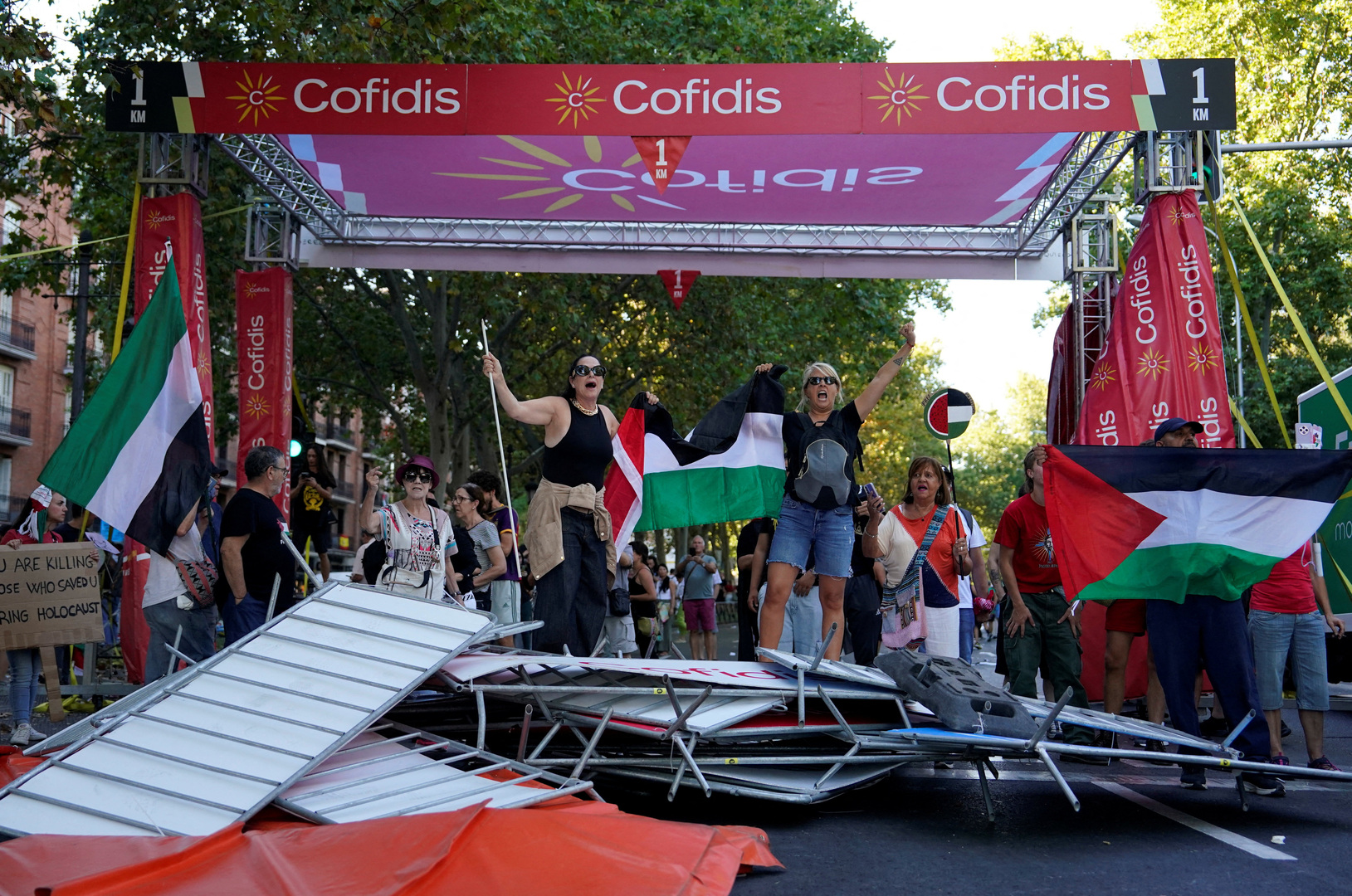

Pro-Palestinian protesters forced Spain’s Vuelta cycling race to be abandoned on its final day, as demonstrators showed their anger over the participation of an Israeli-owned team.
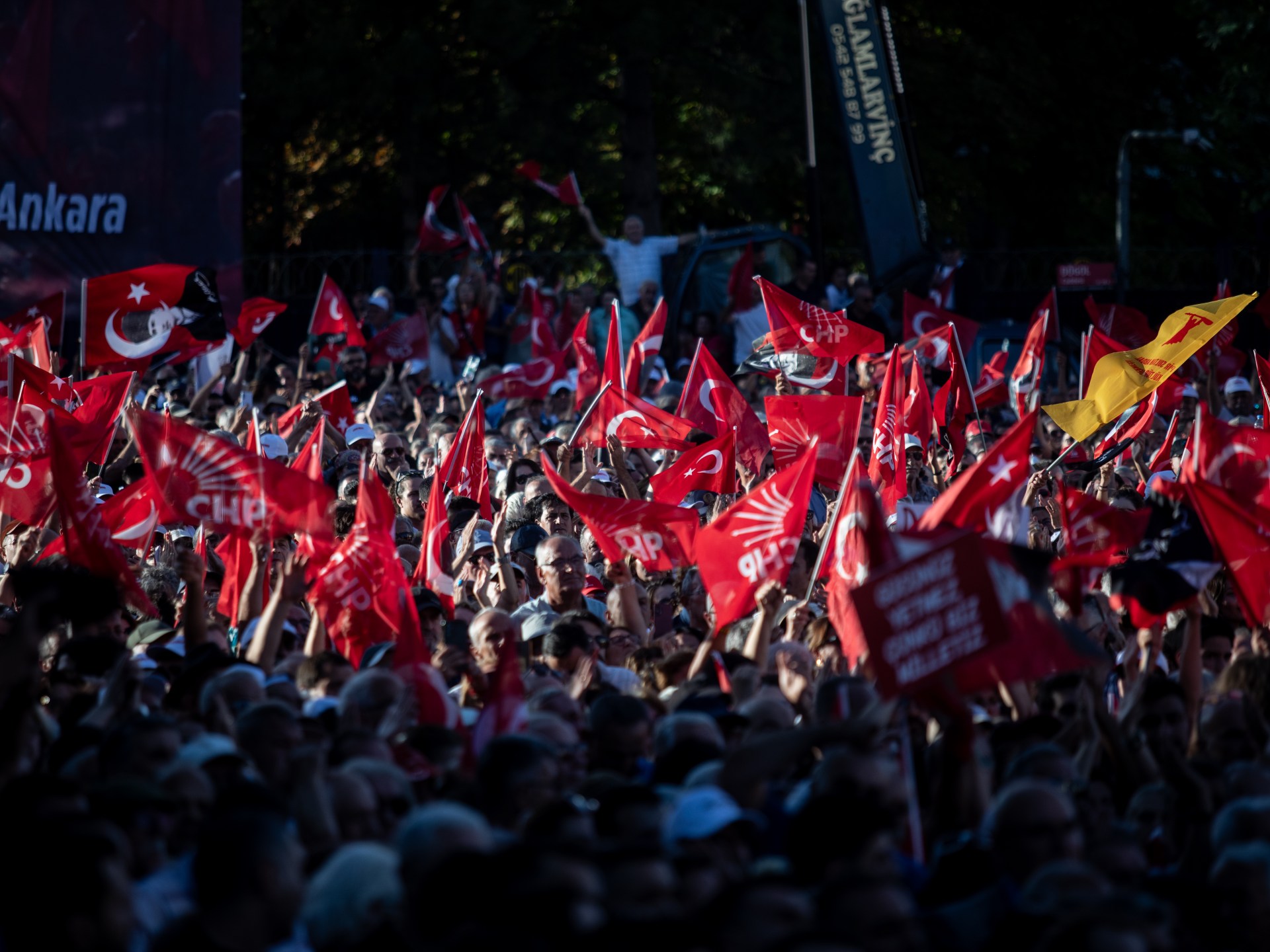
A court in Ankara has postponed the hearing of a controversial case that could oust the leader of Turkiye’s main opposition party, amid protests against the government of President Recep Tayyip Erdogan.
On Monday, the hearing about alleged internal irregularities during the Republican People’s Party’s (CHP) 2023 congress was adjourned until October 24.
list of 2 itemsend of list
Prosecutors have accused CHP leaders of vote-buying at the internal event in 2023 in which Ozgur Ozel was elected chairman, allegations the CHP says are politically motivated.
The case is the latest in a long line of challenges faced by the party.
The Turkish government has rejected accusations of political interference, insisting the judiciary acts independently.
Officials said the cases against CHP figures stem from corruption charges, which the party denied and argued are designed to weaken the opposition.
Turkish authorities have jailed hundreds of CHP members this year for alleged corruption, including Erdogan’s main political rival, Istanbul Mayor Ekrem Imamoglu, who was arrested in March.
Critics say the crackdown is an attempt to destabilise Turkiye’s oldest political party, which won a large victory over Erdogan’s AK Party, or Justice and Development Party, in local elections last year.
On Sunday, Ozel told thousands of protesters in the national capital that the case was part of Erdogan’s wider attempt to undermine democracy.
“This case is political, the allegations are slander,” said Ozel, who claimed CHP was experiencing the “grave consequences” of government oppression.
“Anyone who poses a democratic threat to the government is now the government’s target,” he suggested.
The government denies the claim. Erdogan has described the CHP network as corrupt, comparing it with “an octopus whose arms stretch to other parts of Turkiye and abroad”.
Reporting from Ankara, Al Jazeera’s Sinem Koseoglu said the CHP congress case had been criticised by legal experts.
“Many legal experts are against the procedure because, according to the Turkish laws, any irregularity related to a political party’s internal dynamics should be taken care of by the higher election board, not by a local board,” Koseoglu noted.
Imamoglu, the CHP’s presidential candidate, also accused Erdogan and his allies of anti-democratic actions.
“This isn’t about the CHP, it’s about the existence or absence of democracy in Turkiye,” he said, after appearing in court on Friday in an unrelated case.
The CHP has had a chequered history with democracy despite founding modern Turkiye. The CHP pursued authoritarian policies in the past that suppressed ethnic and religious minorities and it has been a key factor in how Erdogan and his ruling Justice and Development Party (AKP) were able to rise to power and hold it.
There is also an historical distrust of the CHP from many communities who will continue to stand with the AKP regardless.
After Imamoglu’s arrest, Turkiye experienced its largest protests in more than a decade.
In advance of the Ankara court ruling, at least 50,000 people took part in a protest in the capital on Sunday.
Over the weekend, the Turkish authorities arrested 48 more people as part of the inquiry into the CHP.
On September 2, a court removed the leadership of the party’s Istanbul branch over the allegations of vote-buying at its provincial congress. The decision was seen by analysts as a test run for the congress case that was adjourned on Monday.
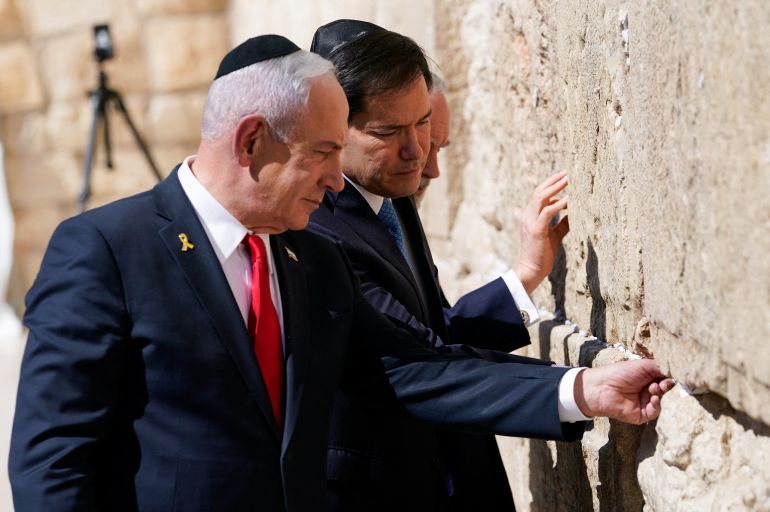
United States Secretary of State Marco Rubio and Prime Minister Benjamin Netanyahu have held further talks as regional leaders gathered in Doha to denounce the unprecedented Israeli attack on Qatar last week, which Netanyahu reiterated Israel takes “full responsibility” for, and the punishing war on Gaza.
The two officials had a three-hour meeting at Netanyahu’s west Jerusalem office on Monday, after which they held a joint news conference in which Netanyahu said Israel and the US will continue to act together to protect the two countries. “Rubio’s visit is a clear message that America stands with Israel in face of terror,” Netanyahu said
list of 4 itemsend of list
Rubio leaned heavily into the Israeli narrative on the war, saying, ” Hamas needs to cease to exist as an armed element that can threaten peace and security in the region. ”
The show of unity on Monday comes a day after Rubio and Netanyahu visited the Western Wall along with US envoy Mike Huckabee and praised strong bilateral relations.
The United Nations Human Rights Council announced on Monday that it will host an urgent debate on Tuesday regarding Israel’s “recent military aggression” in Qatar.
The council said it received two official requests for the debate, one from Pakistan on behalf of member states of the Organization of Islamic Cooperation, and the other from Kuwait on behalf of the Gulf Cooperation Council.
The meeting will mark the council’s 10th urgent debate since its creation in 2006.
Israel has repeatedly dismissed the findings and resolutions of the council on Israeli abuses, including a resolution last year that urged all states to cease selling or transferring arms to Israel given the carnage in Gaza. Both Israel and US boycotted the UN council earlier this year.
In Gaza on Monday, four fetuses and three premature babies died in Nasser Hospital in Khan Younis due to Israeli siege and manmade starvation.
According to Gaza’s Health Ministry, at least 422 people, including 145 children, have died due to the ongoing hunger crisis. Since the UN-backed Integrated Food Security Phase Classification (IPC) report last month that officially declared famine in parts of Gaza, at least 144 deaths have been recorded, including 30 children.
Israeli bombs continue to rain down over Gaza City in the north and its residential buildings as well, with dozens more Palestinians killed on Monday as Israel carries on with systematically destroying the area and seizing it.
Israel’s far right National Security Minister Itamar Ben-Gvir said on Monday he wants to build a luxurious seashore neighbourhood with high-rise buildings for Israeli police officers over the ruins of Gaza.
“We will finish the mission, occupy Gaza, encourage voluntary emigration,” he said, according to Israeli media outlets.
The families of Israeli captives held in Gaza on Monday requested an urgent meeting with army chief Eyal Zamir after he said Netanyahu has kept the military in the dark about next steps after seizing Gaza City, and that occupying the area would not lead to the political and military surrender of Hamas.
Amid Israel’s advancing plans to annex parts of the occupied West Bank, UK-founded Oxfam International was among 80 civil society organisations that launched a new “Stop Trade With Settlements” campaign on Monday, demanding countries to ban all trade with illegal Israeli settlements in occupied Palestinian territory, including by major multinational companies like Maersk, Siemens, and Barclays.
The organisations said in a statement that their campaign targets settlement trade specifically “because of Israel’s ongoing and escalating oppression of Palestinians in the West Bank (including East Jerusalem), fragmentation of its economy, and undermining of the viability of a future Palestinian state“.
During his visit to Israel, Rubio is expected to attend the inauguration of a controversial tunnel project for religious tourists that goes underneath the Palestinian neighbourhood of Silwan to the holy sites.
The project has stirred fears among Palestinian residents that it could further dilute their presence and possibly putting at risk the physical foundations of their homes.
Fakhri Abu Diab, 63, a community spokesman in Silwan, was quoted as saying by the AFP news agency that Rubio should instead come see homes, such as his own, that have been demolished by Israel in what Palestinians see as a targeted campaign to erase them.
“Instead of siding with international law, the US is going the way of extremists and the far right and ignoring our history,” he said.
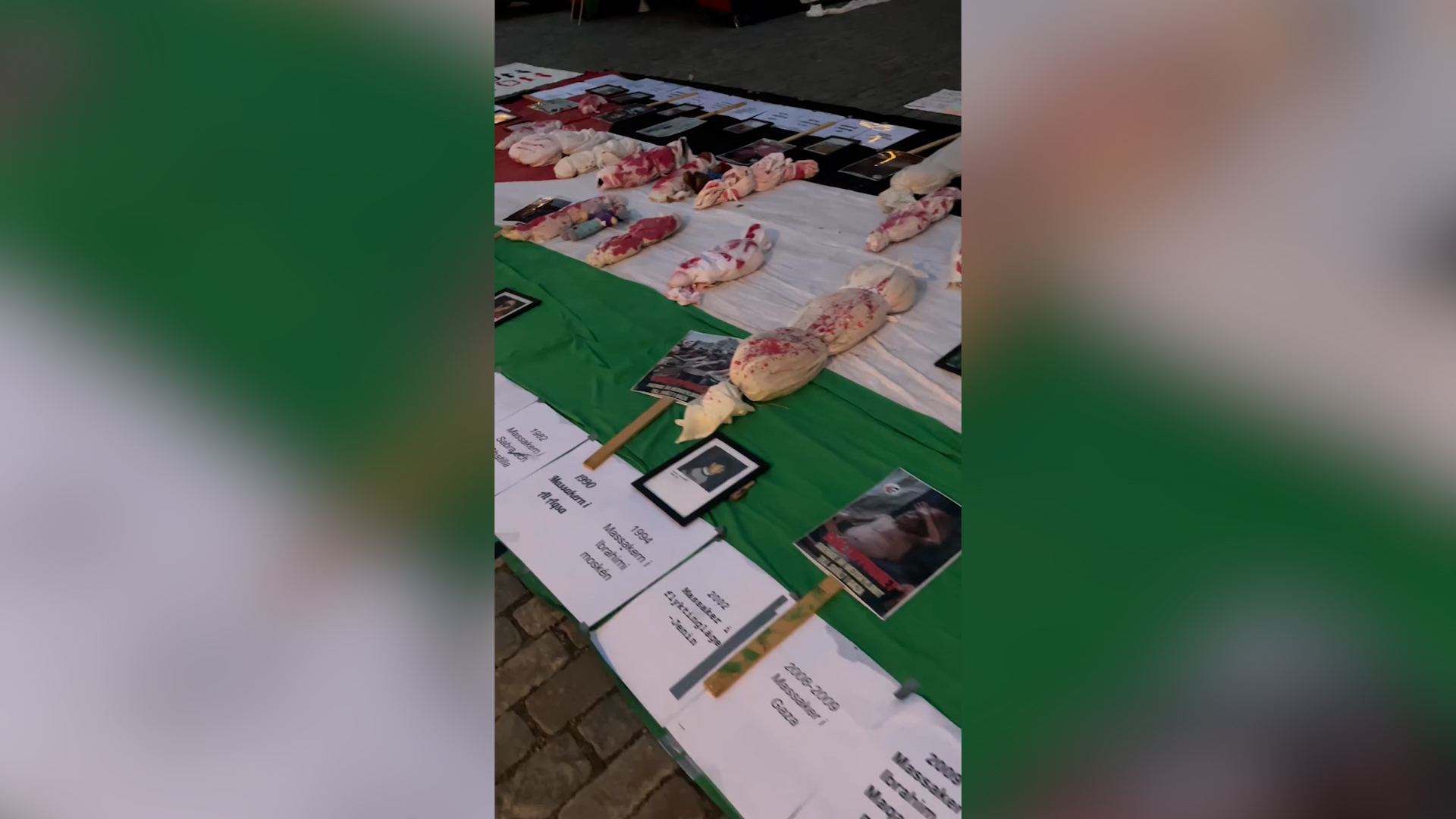
Pro-Palestinian activists placed shrouded dolls covered with red blood in front of the Swedish Parliament in Stockholm on Sunday, to symbolise children killed in Gaza since October 7th. Organisers said the action was a protest against Sweden’s ongoing arms trade with Israel.
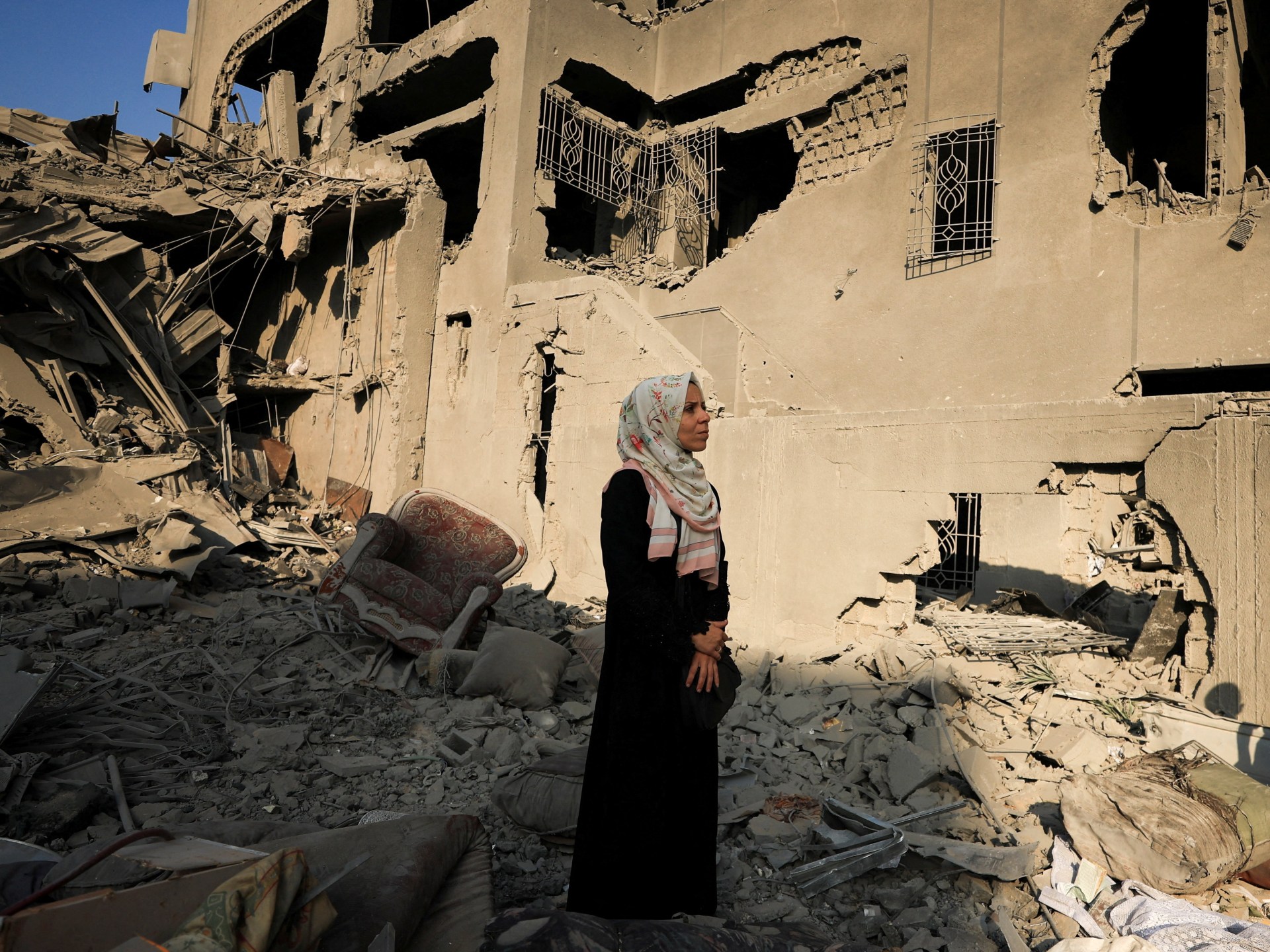
Israeli forces have destroyed at least 16 more buildings in Gaza City, displacing thousands, according to Palestinian officials.
Israel has announced plans to seize the city, currently sheltering approximately one million Palestinians, and forcibly displace them to the south in what rights groups call ethnic cleansing.
Humanitarian organisations warn that an Israeli takeover of Gaza City would devastate a population already experiencing widespread malnutrition.
The Gaza Ministry of Health reported on Sunday that two more Palestinians died of malnutrition and starvation in the past 24 hours, as well as four fetuses and three premature babies in Nasser Hospital in Khan Younis, bringing the total death toll from these causes to at least 422, including 145 children.
After blocking all food from entering Gaza for 11 weeks earlier this year, Israel has slightly increased aid deliveries to a trickle since late July to alleviate food shortages, though the United Nations emphasises that significantly more assistance is required.
Israel has issued threats to civilians to evacuate Gaza City before expanding its ground operations. While tens of thousands have fled, hundreds of thousands remain.
Israeli forces have been operating in four eastern suburbs for weeks, largely reducing three of them to ruins. They are advancing towards the central and western areas where most displaced people have sought refuge.
Many displaced people are unwilling to leave, citing insufficient space and security in southern areas designated by Israel as humanitarian zones.
“The bombardment intensified everywhere, and we took down the tents, more than 20 families, we do not know where to go,” said Musbah al-Kafarna, who is among the displaced in Gaza City.
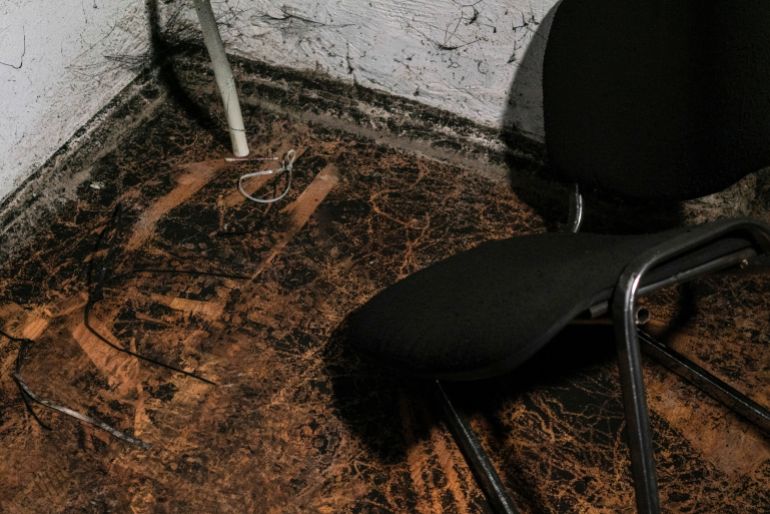
Kyiv, Ukraine – Evhen Ihnatov was a young teenager when Russian forces occupied his hometown.
In the eight months of 2022 when the southern Ukrainian city of Kherson was overtaken, his mother was killed and his brother was forcibly held in Russia.
list of 4 itemsend of list
“We buried her in the countryside. Grandma was beside herself,” Ihnatov told Al Jazeera of the tragedy that befell the family when his mother, Tamara, died. He was aged just 13.
On October 6, 2022, Tamara, 54, had boarded a minibus that was ultimately blown to pieces on a bridge by a misdirected Ukrainian missile.
His brother left for a Russian camp on the day she died.
Now 16 and living in Mykolaiv, studying in a college to become a car mechanic and working part time in a pizzeria, Ihnatov has spoken to Al Jazeera about life in occupied Ukraine.
After graduation, he said he might sign a contract with the army.
But that ambition felt impossible when he was living under Russian control, a period he survived with angst, the denial of all things Russian and a sense of dark humour.
Kherson is the administrative capital of the eponymous southern region the size of Belgium, which mostly lies on the left bank of the Dnipro River, which bisects Ukraine.
Russians occupied the region and Kherson city, which sits on the Dnipro’s right bank, in early March 2022 and rolled out in November that year.
According to Ihnatov, other witnesses and rights groups, Ukrainians were mistreated, assaulted, abducted and tortured from day one. Russia regularly denies intentionally harming civilians.
“They beat people, a real lot,” Ihnatov said. “Those who really stood up are no more.”
A former Ukrainian serviceman he knew was assaulted so violently that he spent a week in an intensive care unit, Ihnatov said.
In the first weeks of occupation, Kherson city was rocked by protest rallies as Ukrainians tried to resist the new rulers. Moscow-appointed authorities soon packed hundreds of people into prisons or basements in large buildings.
“Detained for minor or imaginary transgressions, they were kept for months and used for forced labour or sexual violence,” Nikolay Mitrokhin, a historian with Germany’s Bremen University, told Al Jazeera.
Survivors have said they were forced to dig trenches, clean streets, trim trees and bushes, and haul garbage.
At least 17 women and men were raped by Russian soldiers, Andriy Kostin, Ukraine’s prosecutor general at the time, said in May 2023.
Rallies stopped because of the crackdown, but most of the locals remained pro-Ukrainian, Ihnatov believes. He said the fewer pro-Russian locals were mostly elderly and nostalgic about their Soviet-era youth, attracted to the idea of Russia because of Moscow’s promises of higher pensions.
But to him, the Russian soldiers did not look like “liberators”.
He said many drank heavily and sported prison tattoos. In July 2022, the Wagner mercenary group began recruiting tens of thousands of inmates from Russian prisons with promises of presidential pardons and high pay.
“They look at you like you’re meat, like you’re chicken,” Ihnatov said.
He said ethnic Russian soldiers or ethnic Ukrainians from the separatist region of Donbas in the east whom he saw several times a day on patrols or just moving around were often hostile towards Ukrainian teenagers. Ethnic Chechens were more relaxed and gave them sweets or food, he said.
Fearful of Russian forces, the Ihnatovs – Evhen’s seven siblings and their single, disabled mother who occasionally worked as a seamstress – moved to their grandmother’s house outside Kherson. While still occupied, the village was not as heavily patrolled as the city.
There was a cow, some ducks and a kitchen garden, but they were cash-strapped and moved back to the city right in time for the new school year that began on September 1, 2022.
But Russian-appointed authorities were facing an education disaster.
Many teachers had quit to protest against the Moscow-imposed curriculum, and enrolment fell as some parents preferred to take a risk and keep their children in Ukrainian schools online.
A Russian curriculum was introduced in all of Kherson’s 174 public schools, and by August, Russia-appointed officials and masked soldiers began knocking on doors, threatening parents and offering them monthly subsidies of $35 per child who would go to a Russia-run school.

Ihnatov’s eldest sister, Tetiana, enrolled her school-aged siblings.
Students at Ihnatov’s school were herded into the schoolyard to listen to the Russian anthem. But he and his friends “just turned around and went to have a smoke”, he said.
The school was not far from his apartment. He remembered seeing about 50 children staring at Russian flags and coats of arms on the school building.
His class had 22 students. They were surprised by an oversimplified approach of new teachers who treated the students like they knew nothing.
“They explained everything, every little thing,” he said.
Communication between students changed. Their conversations became cautious, and they did not discuss sensitive issues, worried others would overhear them.
“Everything was happening outside the school,” he said.
The new curriculum was taught in Russian and emphasised Russia’s “greatness” while Ukrainian was reduced to two “foreign language” lessons a week.
“Everything was about references to Russia,” Ihnatov said.
However, to his clique, Russia’s efforts appeared half-hearted.
Teachers were more interested in fake reporting and just gave away A’s, he said.
“They didn’t force us to study, couldn’t make us,” he said.
“I’d crank up the music in my earphones, didn’t care about what they were saying, because anyway I’d get an A. We got good grades for nothing. They wanted to show that everyone studies well,” he said.
Only his history teacher would confront his group of friends while “the rest were scared,” he said.
Their rebelliousness could have cost them more than reprimands had Russians stayed in Kherson longer, according to observers.
“What they did only worked because the occupation was short term. Had the occupation gone on, the screws would have gotten tighter,” Victoria Novikova, a senior researcher with The Reckoning Project, a global team of journalists and lawyers documenting, publicising and building cases of Russia’s alleged war crimes in Ukraine, told Al Jazeera.
After school, Ihnatov took odd jobs in grocery shops or the city market and hung out with his friends.
The new teachers paid special attention to history classes. Instructors from Russia or annexed Crimea were promised as much as $130 a day for teaching in Kherson, the RBK-Ukraine news website reported.
New textbooks “proved” that Ukraine was an “artificial state” whose statehood “never existed” before the 1991 Soviet collapse.
The erasure of Ukrainian identity went hand in hand with the alleged plunder of cultural riches.
Russians robbed the giant Kherson regional library of first editions of Ukrainian classics and other valuable folios and works of art after the building was repeatedly shelled and staffers were denied entry, its director said.
“My eyes don’t want to see it. My heart doesn’t want to accept it,” Nadiya Korotun told Al Jazeera.
Meanwhile, thousands of children in occupied areas were reportedly taken to summer camps in Crimea or Russia – and never came back as part of what Kyiv calls a campaign of abduction and brainwashing.
Kyiv has accused Moscow of forcibly taking 20,000 Ukrainian children away and placing them in foster families or orphanages.
In 2023, The Hague-based International Criminal Court issued an arrest warrant for Russian President Vladimir Putin for the “unlawful deportation and transfer of children”.

Some of the abducted kids “broke”, a presidential adviser on children’s rights said.
“They are really maximally broken. Russians do absolutely everything to achieve that,” Daria Herasymchuk told Al Jazeera. “There were cases of Stockholm syndrome when [the abducted children] became Russian patriots.”
Ihnatov’s elder brother Vlad, 16 at the time, was among those who went to a camp – and was forcibly kept in Russia for a year until his sister travelled there to get him back.
In an unfortunate twist of fate, he had left for the camp hours before his mother was killed.
He was transported to a summer camp on Russia’s Black Sea coast and then transferred to the city of Yevpatoria in annexed Crimea, where he continued school – and was not allowed to return home.
His sister Tetiana travelled there to spend a week in a “basement” while Russian security officers “checked her”, Ihnatov said.
They returned to Ukraine via Belarus and Poland and “don’t talk much” about the experience, he said.
A month after his mother’s death, Moscow decided to withdraw its forces from Kherson city and the region’s right-bank area.
Ukrainian forces were greeted like long-lost family.
“The liberation was about nothing but joy, freedom and joy,” Ihnatov said.
But Russians holed up on the left bank and began shelling the city and flying drones to hunt down civilians.
“In a week or two, the cruellest shelling began. And then – fear,” Ihnatov said.
His sister decided to relocate the family to the Kyiv-controlled city of Mykolaiv, where they live in a rented three-bedroom apartment.
